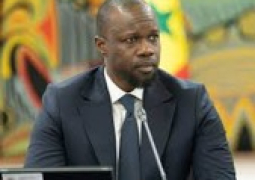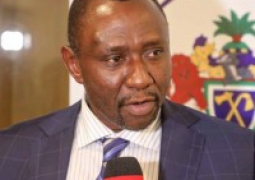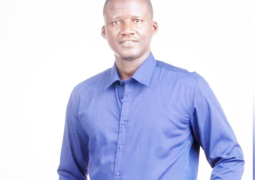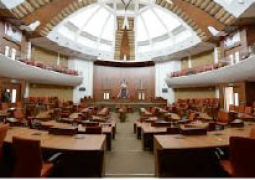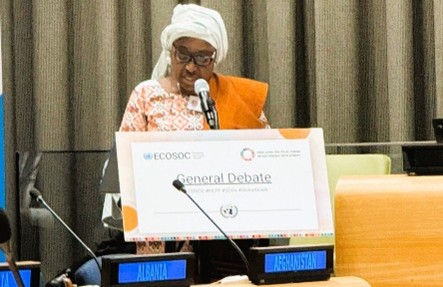
The meeting took place from 21st to 24th July 2025.
The Gambian delegation joined 39 countries including a wide range of stakeholders, government representatives, UN officials, academics, and civil society representatives.
Hon. Seedy Keita. Minister of Finance and Economic Affairs headed the delegation and was accompanied by Health Minister Ahmed Lamin Samateh, Gender Minister Fatou Kinteh and Permanent Secretary Illo Jallow of the Ministry of Gender, Children and Social Welfare.
On Tuesday 22 July, the high-level roundtable Forum 2025 “Demographic Dimensions of Gender Equality and Health: Synergies for Sustainable Development” was co-hosted by UNFPA, Dominican Republic, Kazakhstan, Finland, The Gambia, WHO, and UNICEF.
The Minister of Gender, Children and Social Welfare, Hon. Fatou Kinteh took part in the high-level roundtable, during which The Gambia was congratulated on the launch of the Sahel Women’s Empowerment and Demographic Dividend Plus (SWEDD+), a bold initiative aimed at transforming the lives of adolescent girls and young women.
Minister Kinteh was asked to provide an overview of how this project alongside other national efforts will contribute to advancing the empowerment of women and girls in The Gambia.
In her response she stated that according to the 2024 Population and Housing Census, women form 52% of the population of the Gambia, and the youth including adolescent girls are over 60% of the population. The level of vulnerability of these groups in terms of illiteracy, early marriage, other forms of harmful traditional practices and poverty cannot be overemphasized, she said.
“All forms of support to these groups for their overall empowerment is of paramount importance to ensure sustained socio-economic development of The Gambia. The Gambia is one of the beneficiary countries of the SWEDD+ project. Thanks and appreciation to the World Bank for the support,” she stated.
The project will promote and ensure birth registration as well as the registration of marriages, which will promote the delay of marriages until age 18, thus preventing early marriages. It will enable girls to complete high school and engage in TVET or university education before marriage. This will create employability, subsequently leading to their economic empowerment.
She noted that through the creation of safe spaces, 52,000 adolescent girls will be provided with information on sexual and reproductive health, and a livelihood skill of their choice to ensure their employability.
She emphasised that continuity and completion of secondary education by all girls, especially those who are vulnerable will be provided with the necessary support for inclusivity leaving no one behind. It is for this reason that a school re-entry programme is being supported by the SWEDD+ project to give a second chance to girls who drop out of school for one reason or the other.
Adolescent girls who are in and out of school and young women between the ages of 15 to 24 will be supported through livelihood skills training, entrepreneurship training and provision of grants to run a micro enterprise activity of their choice.
Hon. Kinteh said economic empowerment will be utilised as a strategy to reduce infant and maternal mortality. A comprehensive gender based violence programme will be implemented through training and awareness creation and service delivery.
The design of a comprehensive Social and Behaviour Change Communication programme is at an advanced stage for social norm change, for the acceptance and ownership of the project by all, especially the communities.
She said economic empowerment for women is synonymous with economic independence, poverty alleviation and wealth creation. Improvement in the status of women is equaled to improvement in the welfare of families, better accommodation, better health, better education more so for the girl child, development for communities and the country.


